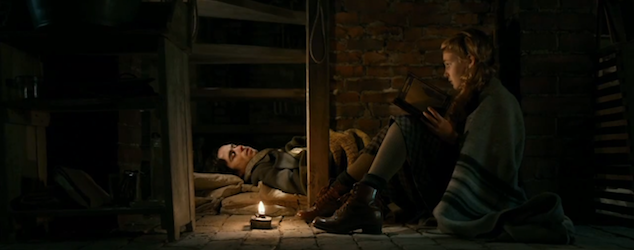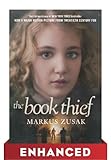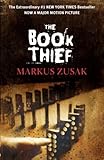The Book Thief tugs at your heartstrings, especially if you happen to be a book lover

‘The Book Thief’ offers a moving, historically-inspired tale with breathtaking cinematography, spirited acting and a well-paced plot destined to steal your heart if you have an appreciation for history, books or the resiliency of the human spirit during difficult times.
I recently saw one of those inspirational quote memes on Facebook that said, “Reading gives us someplace to go when we have to stay where we are.” I can’t think of a more appropriate quote to sum up my impressions of The Book Thief, the new 20th Century Fox film directed by Brian Percival.
From the moment you first see the train traveling swiftly over the snow-covered landscapes of late 1930s Germany, to the fiery rubble of a bombed neighborhood in the final scenes, this film is breathtakingly beautiful in its cinematography. While it was at times happy and at other times bittersweet, it was a joy to watch every scene unfold before my eyes.
First off, let me say I really enjoyed the personification of Death, as he is the story’s narrator. This lends an almost haunting quality to it from the first moment we are introduced. One gets the impression this story is not going to end happily when all is said and done, and I was interested to see how it would all pan out. My only gripe might be I would have liked to have heard from Death a little more often because he’s such a fascinating character. We’re all going to die someday; it’s nice to know Death is waiting for us with a touch of morbid curiosity and such a good sense of humor.
Set in World War II Germany, The Book Thief is the story of a young girl named Liesel (Sophie Nelisse) who is sent to live with foster parents (Geoffrey Rush and Emily Watson) when her mother is taken away for being an accused Communist. Liesel is awkward around her foster parents at first – the mother especially seems difficult to get along with – and she indignantly insists that she’s going to run away and find her real mother the first chance she gets. One can’t help but feel pity for her. Being transitioned into a foster home is difficult enough no matter the circumstances or era, but Liesel also loses a little brother to illness during the train ride, which makes it even more heartbreaking. One really gets a sense of the loneliness she must be feeling.
Sophie Nelisse is wonderfully expressive as Liesel and Geoffrey Rush is endearing as Liesel’s foster father, Hans Hubermann. The two develop an instant and natural rapport when he teaches her to read and presents her with a chalkboard to keep track of new words she learns that she finds interesting. It’s this budding father-daughter relationship that allows Liesel to better adjust to her new life.
The story does a pretty good job of exploring how Nazi fanaticism spread throughout the country in ways that one doesn’t usually take the time to think about. We catch glimpses here and there of German schoolchildren reciting pledges and singing songs of devotion to the Fuhrer that I’m sure few of them even understood. Brainwashing began early. Liesel’s best friend Rudy (Nico Liersch) is one of the best athletes in their class and there is a scene in which he is chastised for painting himself with mud because he wanted to look more like famed Olympic runner Jesse Owens. The message that you’re not supposed to aspire to be anything other than a proud Aryan comes across loud and clear.
The political unrest and changes happen almost so gradually the German people don’t take much notice at first. The Book Thief shows what atrocities men are capable of both to each other and to the written word. The book nerd in me hated witnessing the book-burning scene in the town square, as we found out what the Nazi party thought of literature written in different countries. I was silently cheering for Liesel when she had the courage to go back and steal one of the banned books off the flaming pile when she thought nobody was looking.
When a young Jewish man named Max (Ben Schnetzer) comes to hide in the Hubermann family’s basement to avoid the devastating persecution of the Holocaust, Liesel begins to understand more about what is happening and that she must be brave during these difficult times. It’s also Max that further develops her appreciation for the power of words. When he becomes bedridden with illness, she “borrows” books from a local magistrate’s home library to read to him in the hopes that he’ll recover more quickly. Reading, and ultimately writing, becomes a way for Liesel to adjust to all the changes that are happening in the world around her. What a great lesson for anyone to learn, especially a young adolescent.
Like many of the films I review for CliqueClack, I walked into this one without any expectations. I’d never read the book of the same title, nor had I heard of it prior to this month. But what a refreshing surprise to see a film that made me think both during and afterwards, while tugging at my heartstrings for various reasons. It’s my humble belief that if you manage to walk out of The Book Thief without at least the hint of a tear in your eye, you probably have no soul.
My favorite moments of The Book Thief take place between Liesel and Max because there is such an honest tenderness to their budding friendship. There is a hilarious scene in which the two pretend to be Hitler’s mother writing him letters mocking everything from his wardrobe to his little mustache in a way that only a mother could truly get away with.
After watching this film, I’ve decided that what I ultimately want before Death comes knocking at my door is a Max. I want someone to inspire my love for words and writing – a best friend and a confidant who eventually might turn out to be the greatest love of my life. If he’s a secret I hide away from the world and keep just for myself, even better. But perhaps you’ll come out of The Book Thief with other life lessons learned. Hopefully, at the very least, you’ll take away a deeper understanding of the phrase “words are life … the pages are meant for you to fill.”
 CliqueClack
CliqueClack

